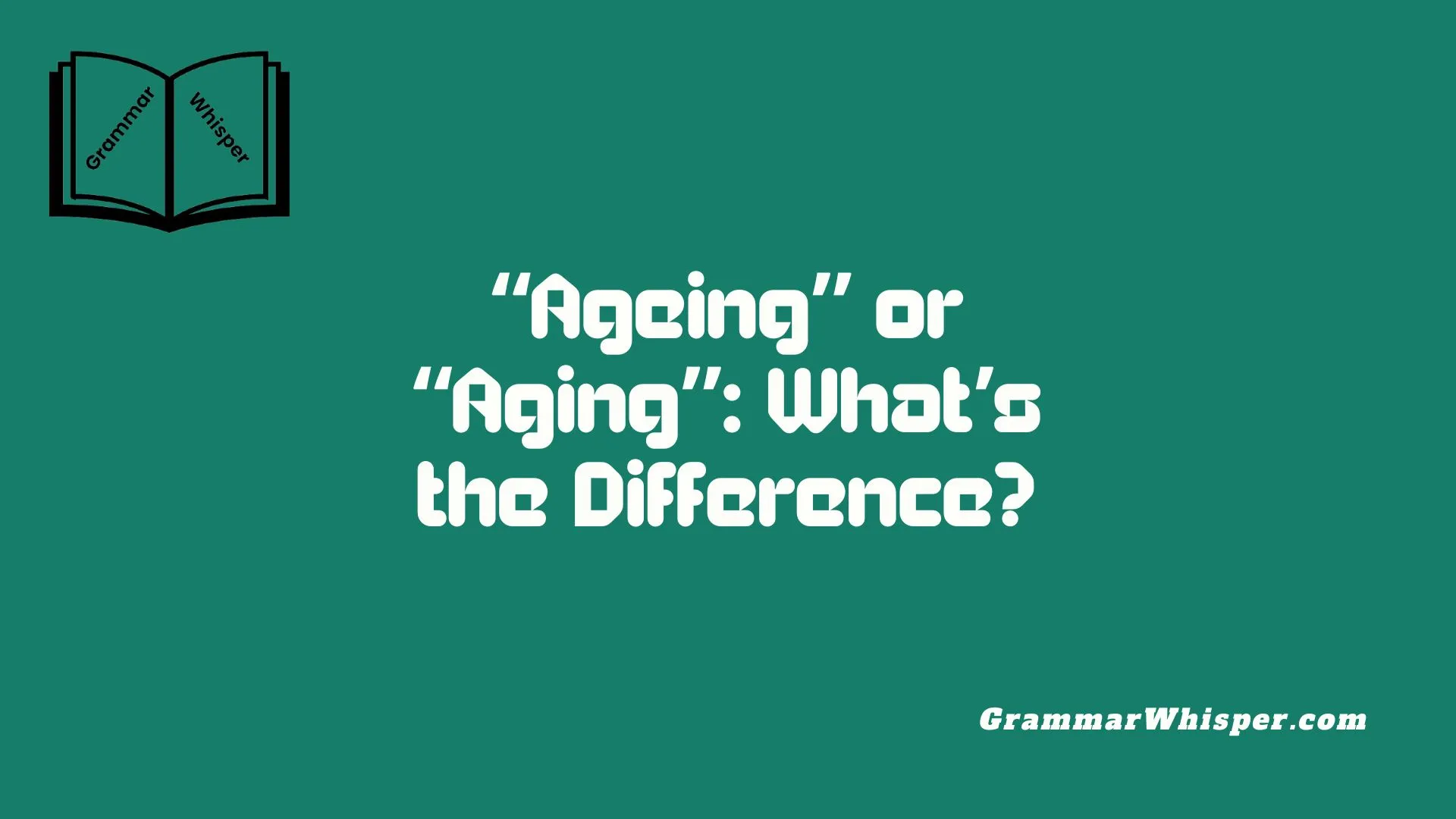In today’s globalized world, the way we use words like “Ageing” or “Aging” can shift dramatically depending on who we’re speaking to – or writing for. I once edited a report that had both spellings scattered throughout. It looked messy. While both are technically correct, their variation reflects regional preferences. British English favors ageing, whereas American English sticks with aging. The challenge is knowing which to use, especially when trying to avoid awkward conundrums in professional writing. Although both forms are interchangeable in meaning, understanding your audience and the context helps you make the right call.
When you write across global markets, paying attention to grammatical functions and spelling trends becomes second nature. I always keep a guide close at hand to check what’s common in which country. Spelling isn’t just cosmetic – it impacts how polished and consistent your piece feels. In different English dialects, you’ll also see shifts in real-life usage. Before you hit publish, dive into your text again and ask: Does this sound natural for the region I’m writing for? That one habit has saved me from many embarrassing edits.
Spelling Showdown: “Ageing” vs. “Aging”
At first glance, it’s a one-letter difference. But that extra “e” does more than add a syllable – it reflects deep historical and linguistic differences between British English and American English.
| Spelling | Region/Common Usage | Example |
| Ageing | UK, Australia, New Zealand | The ageing population is growing. |
| Aging | United States, Canada | Aging affects everyone eventually. |
Key point:
Both words mean the same thing – the process of becoming older – but their spellings depend on where and how you’re writing.
Why the Spelling Split Exists
To understand the difference, we have to go back to the early 19th century. The culprit? Noah Webster, the American lexicographer who wanted to standardize and simplify American English spelling.
Here’s what happened:
- Webster pushed for reforms like color instead of colour, and honor instead of honour.
- One of his less obvious reforms was simplifying word endings. He dropped the e from words like “age” when adding suffixes, creating aging instead of ageing.
Common Spelling Pairs
| British English | American English |
| Colour | Color |
| Ageing | Aging |
| Travelling | Traveling |
| Realise | Realize |
| Centre | Center |
So, this isn’t an isolated case. It’s part of a broader pattern of spelling divergence.
Usage in American English: Why “Aging” Dominates
In American English, “aging” is the only accepted spelling. You’ll see it used in newspapers, medical journals, government policy, and advertising.
Major Style Guides and Their Preferences
| Source | Preferred Spelling |
| AP Stylebook | Aging |
| Merriam-Webster Dictionary | Aging |
| Chicago Manual of Style | Aging |
| U.S. Department of Health | Aging |
“The nation’s aging population poses economic and social challenges for the next generation.” – U.S. Census Bureau, 2024 Report on Demographics
In fields like medicine, marketing, and social sciences, the term “aging” appears frequently:
- Anti-aging skincare
- Aging population in the U.S.
- Healthy aging programs
Note: Even Canadian publications tend to follow U.S. spelling conventions, so “aging” is widely used in Canada as well.
British, Australian, and Commonwealth English: The Case for “Ageing”
In contrast, countries following British English conventions such as the UK, Australia, and New Zealand, stick with “ageing.”
It’s the dominant form in:
- Government reports
- Scientific research
- News media
- Education and health sectors
Examples from Major Sources
“Ageing is a global issue with profound implications for the UK’s economy and social fabric.” – UK House of Lords, Ageing Report 2023
“Our focus is on supporting healthy ageing through public health initiatives.” – Australian Department of Health and Aged Care
| Region | Primary Spelling Used |
| United Kingdom | Ageing |
| Australia | Ageing |
| New Zealand | Ageing |
| South Africa | Ageing |
| India (formal use) | Ageing |
Important: British publications do not typically accept “aging” as correct. In fact, many UK grammar and style guides flag it as a spelling error.
“Aging” vs. “Ageing” in Global Publications
Language doesn’t live in a vacuum – it’s shaped by media, policy, and international standards. Here’s how the two spellings appear across global outlets:
| Publication | Region | Spelling Used |
| The New York Times | USA | Aging |
| The Guardian | UK | Ageing |
| World Health Organization | International | Ageing |
| Centers for Disease Control | USA | Aging |
| BBC | UK | Ageing |
| Canadian Broadcasting Corp. | Canada | Aging |
While global institutions like the World Health Organization (WHO) use “ageing,” the Centers for Disease Control (CDC) in the U.S. stick with “aging.” The variation often reflects the origin of the content.
Grammar and Function: Adjective, Gerund, Verb
Both “aging” and “ageing” serve multiple grammatical roles. Context determines the function – not the spelling.
As an Adjective
- Aging rock star
- Ageing infrastructure
Used to describe something getting older, either physically, biologically, or metaphorically.
As a Verb (Present Participle)
- She is aging gracefully.
- The population is ageing quickly.
Here, it acts as a progressive form of the verb “to age.”
As a Gerund (Noun Form)
- Aging is a natural process.
- Policies focused on ageing require urgent funding.
The gerund form turns the action of aging into a concept or topic of discussion.
| Grammatical Role | Example (Aging) | Example (Ageing) |
| Adjective | The aging process is complex. | The ageing brain requires care. |
| Verb | She is aging fast. | He is ageing quickly. |
| Gerund | Aging isn’t reversible. | Ageing should be embraced. |
Language Evolution and Modern Trends
In today’s fast-paced digital world, spelling norms are influenced by:
- Autocorrect
- Search engine preferences
- AI-generated content
- Cross-border communication
Here’s what’s happening:
- Search engines tend to auto-suggest “aging” even in UK browsers.
- Grammar tools like Grammarly default to U.S. English unless manually switched.
- AI and translation software often “Americanize” spelling unless corrected.
However, style consistency is returning thanks to tools that let you set regional preferences. Major CMS platforms and grammar checkers allow you to choose “British English” to preserve terms like “ageing.”
How to Choose: Context, Audience, and Consistency
The golden rule? Know your audience and stay consistent.
When to Use “Aging”:
- You’re writing for a U.S. audience.
- Your source material is American.
- You follow AP or Chicago style.
When to Use “Ageing”:
- You’re writing for a UK, Australian, or international audience.
- You’re referencing organizations like WHO or NHS.
- You follow Oxford or UK government style guides.
| Audience | Use This Spelling |
| U.S. readers | Aging |
| UK/Commonwealth | Ageing |
| Global NGOs | Ageing |
| Academic Journals | Depends on region |
🔑 Pro Tip: Never mix both in the same document. Pick one, and apply it throughout.
Easy Memory Hacks to Remember the Difference
Here are some tricks to help you get it right every time:
- Ageing = England → Both contain “e”.
- Aging = America → Shorter, like many American spellings.
- Picture “ageing” as more formal, traditional – think Oxford or the BBC.
- Think of “aging” as leaner and modern – think Silicon Valley or The New York Times.
Real-World Usage: Examples Across Contexts
In Healthcare
- UK: “Healthy Ageing” initiatives by the NHS.
- US: “Healthy Aging Program” by the CDC.
In Marketing
- UK: “Anti-ageing cream with retinol.”
- US: “Anti-aging skincare for sensitive skin.”
In Academia
- British Journal of Ageing Studies
- U.S. publication: The Journals of Gerontology: Series A, Biological Sciences and Medical Sciences
“Anti-ageing is a massive industry in Europe, generating over $9 billion annually.” – Euromonitor International, 2024
Conclusion
So – is it “ageing” or “aging”? The answer is both, depending on your audience and style guide.
If you’re writing for a U.S. or Canadian audience, go with “aging.” If you’re targeting UK, Australia, or global readers, choose “ageing.”
Just remember:
- The spelling difference doesn’t change the meaning.
- Context and consistency are key.
- Choose one and stick with it.
Bonus: Trusted Resources and Tools
- Merriam-Webster: Aging
- BBC News Style Guide
- UK Government Publications
FAQs
Is “ageing” incorrect in American English?
Yes – American English only recognizes “aging.”
Can I use “ageing” in a U.S.-based academic paper?
Not unless your professor or journal specifically allows British spelling.
Which is used more globally?
Statistically, “aging” appears more frequently online, but “ageing” is standard in more countries overall.
What does Grammarly suggest?
It defaults to “aging” unless you switch it to British English.
Is “anti-ageing” wrong?
Not in the UK. It’s the standard there. But in the U.S., it’s “anti-aging.”











